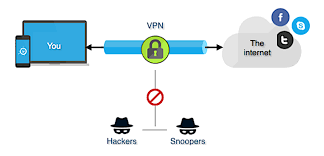The Benefits of Using a Private Network VPN
In today’s interconnected world, the need for online privacy and security has never been greater. One effective tool that individuals and businesses can utilise to enhance their online security is a Virtual Private Network (VPN).
A private network VPN creates a secure connection between your device and the internet by encrypting your data and routing it through a remote server. This not only protects your sensitive information from potential cyber threats but also allows you to browse the web anonymously.
One of the key benefits of using a private network VPN is enhanced security. By encrypting your internet traffic, a VPN shields your data from hackers, identity thieves, and other malicious actors who may be trying to intercept it. This is particularly important when using public Wi-Fi networks, where your information is more vulnerable to attacks.
Additionally, a private network VPN enables you to access geo-restricted content by masking your IP address and making it appear as though you are browsing from a different location. This can be useful for streaming services, accessing region-locked websites, or bypassing censorship in certain countries.
Furthermore, using a VPN can help protect your privacy by preventing internet service providers (ISPs) and other third parties from tracking your online activities. Your browsing history remains confidential, giving you greater control over your personal information.
Overall, a private network VPN offers peace of mind and increased security in an increasingly digital world. Whether you are concerned about safeguarding sensitive data or accessing restricted content, incorporating a VPN into your online routine can provide numerous benefits.
Six Essential Tips for Maintaining a Secure Private Network with VPN Usage
- Choose a reputable VPN provider to ensure secure and reliable connection.
- Enable encryption to protect your data from potential breaches.
- Regularly update your VPN software to patch any security vulnerabilities.
- Avoid using public Wi-Fi without a VPN to prevent data interception by hackers.
- Consider using multi-factor authentication for an added layer of security.
- Be cautious when granting VPN access to third parties and regularly review permissions.
Choose a reputable VPN provider to ensure secure and reliable connection.
When utilising a private network VPN, it is crucial to select a reputable provider to guarantee a secure and reliable connection. By choosing a trusted VPN service, you can have confidence that your data is encrypted and protected from potential cyber threats. A reputable provider will also offer reliable server connections, ensuring that you can browse the internet with peace of mind knowing that your online activities are safeguarded. Prioritising a reputable VPN provider is an essential step in enhancing your online security and privacy.
Enable encryption to protect your data from potential breaches.
Enabling encryption on your private network VPN is a crucial step in safeguarding your data from potential breaches. By encrypting your internet traffic, you create a secure tunnel that shields your sensitive information from cyber threats such as hackers and identity thieves. This added layer of security ensures that your data remains confidential and protected as it travels between your device and the internet, giving you peace of mind knowing that your online activities are secure and private.
Regularly update your VPN software to patch any security vulnerabilities.
It is crucial to regularly update your VPN software to patch any security vulnerabilities that may arise. By keeping your VPN software up-to-date, you ensure that you are equipped with the latest security features and protections against emerging threats. Regular updates help to strengthen the encryption protocols used by your VPN, enhancing the overall security of your online activities. Stay proactive in maintaining the integrity of your private network VPN by staying informed about software updates and promptly installing them to safeguard your data and privacy effectively.
Avoid using public Wi-Fi without a VPN to prevent data interception by hackers.
To safeguard your sensitive data and prevent potential interception by hackers, it is advisable to avoid using public Wi-Fi networks without the protection of a Virtual Private Network (VPN). Public Wi-Fi hotspots are often targeted by cybercriminals looking to exploit vulnerabilities and intercept users’ information. By utilising a VPN when connecting to public Wi-Fi, you can encrypt your data and establish a secure connection, ensuring that your online activities remain private and protected from malicious actors.
Consider using multi-factor authentication for an added layer of security.
When utilising a private network VPN, it is advisable to consider implementing multi-factor authentication as an additional layer of security. By requiring multiple forms of verification before granting access, such as a password and a unique code sent to your mobile device, multi-factor authentication enhances the protection of your sensitive data and further fortifies your online privacy. This extra security measure can significantly reduce the risk of unauthorised access to your VPN connection, ensuring that your digital activities remain secure and confidential.
Be cautious when granting VPN access to third parties and regularly review permissions.
When utilising a private network VPN, it is essential to exercise caution when granting access to third parties and to conduct regular reviews of permissions. Granting VPN access to external parties can introduce potential security risks, as it expands the network’s exposure to external threats. By carefully evaluating and monitoring the permissions granted to third parties, users can mitigate the risk of unauthorised access and data breaches. Regularly reviewing permissions ensures that access rights are up-to-date and aligned with current security protocols, enhancing the overall effectiveness of the VPN in safeguarding sensitive information.

